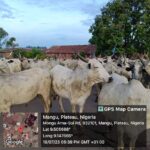By Hassan Zaggi
In an effort to expedite COVID-19 vaccine delivery and distribution among high priority risks groups, increase vaccine confidence and generate demand, the federation government has received a grant worth over nine million dollars from Canada’s Global Initiative for Vaccine Equity (CanGIVE).
Speaking at the formal launch of the initiative in Abuja, Wednesday, theHead of Mission and Representative of the World Health Organization (WHO), Nigeria, Dr. Walter Kazadi Mulombo, disclosed that the grant will be implemented in the 15 lowest performing states.
The states, according to him, include Benue, Kogi, Taraba, Katsina, Kebbi, Anambra, Ebonyi, Akwa Ibom, Bayelsa, Delta, Edo, Rivers, Lagos, Ogun and Ondo.
The grant, he explained, focuses on community engagement, within the context of addressing inequities in service delivery and disparities in gender at sub-national geographical locations.
“The grant will enable the WHO Nigeria country office provide technical support to strengthen health systems, specially for data management and surveillance linked to the Transforming African Surveillance Systems (TASS) Flagship initiative, increase COVID-19 vaccine demand generation and uptake in an integrated mode with routine immunization and other PHC services,” Dr. Mulombo, further explained.
He lamented that despite this achievement recorded by the Federal Government in the area of the COVID-19 vaccination, “there is still more work to be done.
“As of now, 14 states are performing less than 50 per cent vaccination coverage of their target population, and we still have some vulnerable populations that are not sufficiently covered.
“Key among these subgroups are the aged (50 years and above), people with co-morbidities, the health workers, people living in humanitarian and security compromised communities and the pregnant women.”
He assured that the WHO will continue to collaborate with partners to support the federal government’s effort to ensure that the vulnerable population are protected and the structures and health systems are strengthened.
“We shall continue to provide technical support to implement one health approach to preparedness and response, and integrate COVID-19 surveillance and response activities into routine health programmes.
“Together with partners and the Federal Government of Nigeria, we should dedicate sustained attention and resources to preparedness and resilience to counter future threats,” Dr. Mulombo said.
While launching the initiative, the Executive Director of the National Primary Health Care Development Agency (NPHCDA), Dr. Faisal Shuaib, assured the Canadian government, donors and partners that the Nigerian government is fully committed to sustaining and improving COVID-19 and routine immunization performance, along with other primary healthcare services.
The grant which will be implemented through the WHO, he explained, will also contribute to strengthening the health system, addressing service delivery inequities and gender disparities at the sub-national level.
Dr. Shuaib expressed confidence that WHO will continue to support Nigeria’s efforts to enhance vaccine delivery, distribution, and public confidence, as well as generate demand.
He recalled that: “The COVID-19 vaccination program was launched in Nigeria on March 5, 2021, and thanks to the support of the federal, state governments, and all our partners, we have reached over 75% of the target population of individuals aged 18 and above with at least one dose of the COVID-19 vaccine.
“The program has been implemented in phases, ensuring that eligible populations are reached and no one is left behind. Nigeria was among the first countries to establish an electronic registry and integrate COVID-19 vaccination with other primary healthcare services.
“Our “One Country, One Team, One Plan, One Budget” approach reflects our commitment to integrating lessons learned during and after the pandemic into our healthcare system.”
Earlier, the High Commissioner of Canada to Nigeria, Jamie Christoff said, that the project is one of Canada’s historical institutional relationship with the WHO to support Nigeria in preventing disease and protecting the vulnerable population.
According to Christoff, even though COVID-19 is no longer a global emergency, there is need for combined efforts to reinforce public health systems as part of a sustainable recovery.
“We must intentionally link up these efforts with routine immunisation and other services. This can help, for example, to reach children who missed routine vaccinations over the pandemic.
“We know that ultimately, it takes a health system to turn a vaccine into vaccination.”
He further noted that : “Under CanGIVE, the WHO project will be implemented in seven countries, where Nigeria receives the greatest share of $9 million Canadian Dollars.
“Nigeria was also amongst the first countries to receive COVID-19 vaccine doses from Canada in September of 2021, and I am pleased to be able to continue Canada’s support to Nigeria with this latest project.”



